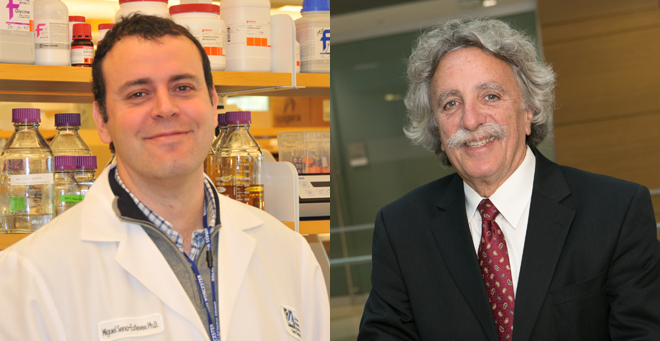 |
|
|
Miguel Sena-Esteves, PhD, and Allan Jacobson, PhD |
The Gilbert Family Foundation has announced that UMass Medical School will receive funding from a $12 million gene therapy initiative to address the underlying cause of neurofibromatosis type 1. UMMS investigators will work to accelerate the development of therapies that address the core genetic abnormalities in NF1 patients. The funding is part of the Gilbert Family Foundation’s Gene Therapy Initiative, a three-year initiative to identify promising gene therapy techniques for NF1.
“We are committed to funding revolutionary and big-idea research,” said Dan Gilbert, co-founder of the Gilbert Family Foundation. “The teams we have partnered with share this vision and our family is honored to be working closely with this talented group of researchers and physicians.”
“We are very proud to have been selected by the foundation and look forward to developing new gene therapies for NF1,” said Miguel Sena-Esteves, PhD, associate professor of neurology.
NF1 is a genetic disorder caused by mutations in the neurofibromin gene. Patients with NF1 suffer from a variety of health challenges, including skin lesions, benign and malignant tumors of the optic and peripheral nervous system, and cognitive deficits. Current treatment options are limited and do not address the primary genetic defect associated with this disorder, namely the reduction in levels or complete loss of the neurofibromin protein within affected tissues.
In addition to Dr. Sena-Esteves, the UMMS research team includes Allan Jacobson, PhD, the Gerald L. Haidak, MD, and Zelda S. Haidak Professor in Cell Biology and chair and professor of microbiology & physiological systems, as well as Scot Wolfe, PhD, the professor of molecular, cell and cancer biology, and Jonathan Watts, PhD, associate professor of RNA therapeutics. They will partner with research colleagues at Massachusetts General Hospital to develop therapeutics that directly address the core deficit in NF1 patients. Their efforts will be focused on two principal areas: improved viral delivery systems to deliver therapeutic cargo such as neurofibromin to target cell types (e.g. Schwann cells); and the development of zinc finger proteins and chemically modified oligonucleotides to restore neurofibromin levels in haploinsufficient cells.
“During the first two years of the project, the efficacy of different therapeutic modalities will be evaluated, first in cell culture and then in mouse models of NF1,” said Sena-Esteves. “In year three, we will focus exclusively on advancing the most promising therapeutic strategies through more intense efficacy and safety studies in NF1 mouse models to produce datasets that will be necessary for discussions with the FDA intended to prepare for trials of the drug candidates in patients.”